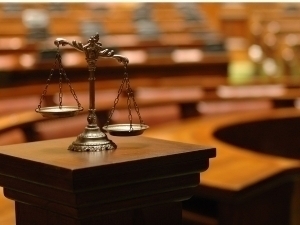Corruption show or justice served? Analyzing the Samarkand arrests
Review
−
17 February 2025 12918 8 minutes
“Every person whose actions are determined to contain elements of a crime must be held accountable.” – Article 10 of the Criminal Code of the Republic of Uzbekistan.
However, the arrest of individuals as suspects or accused must be carried out according to the norms established by the Constitution of the Republic of Uzbekistan and the Criminal Code of the Republic of Uzbekistan.
On February 14, at a meeting in Samarkand addressing corruption cases in the energy sector, Deputy Prosecutor General Shohrukh Aminov presided over a session with officials from “Hududiy elektr tarmoqlari” (Regional Electric Networks) and “Hududgaztaminot” (Regional gas supply) joint-stock companies. During this meeting, seven employees suspected of corruption were detained. Photos of them in handcuffs were subsequently published, sparking widespread debate.
Social media users were quick to comment, with remarks such as, “Do you think it’s fair for someone who left home in the morning to attend a meeting to be arrested without warning?” and “Why are those of lesser importance paraded in handcuffs while influential figures go unexposed?” Public figures like Qobil Khidirov and Rasul Kusherbaev even labeled the incident a “show.”
News about gas theft is common, and the seven arrested employees were likely suspected of stealing gas on a large scale. Yet, their public arrest in front of about a hundred colleagues raised eyebrows. Critics argue that the focus is not on the alleged crime but rather on the method of arrest. The presumption of innocence, clearly stated in the Constitution, appears to have been overlooked. This raises a fundamental question: Was this public arrest legal, or was it merely a public “show,” as critics suggest?
QALAMPIR.UZ sought legal insight from lawyer Abdumalik Abdullaev, who described the event as a repressive approach.
“We are as intolerant of corruption as anyone else. However, the law clearly outlines procedures for combating corruption and disseminating information about it,” Abdullaev noted.
“First, if a person is accused, they are not automatically considered a suspect. The term ‘accused’ suggests a judicial ruling with a legally binding indictment.
Second, to detain a suspect, there must be an official decision from an inquiry officer, investigator, or prosecutor.
Third, photos showed handcuffs on the seven individuals. According to Article 23 of the Law ‘On Internal Affairs Bodies,’ handcuffs are classified as special means, and specific conditions justify their use. In this case, however, none of these conditions were met. Therefore, we view this as a repressive act that publicly humiliated the suspects,” Abdullayev explained.
Lawyer Khairulla Qosimov also voiced his concerns, emphasizing that degrading an individual’s dignity is unacceptable.
“These employees were arrested in front of their colleagues. They may be suspects, but that does not justify degrading their honor and dignity,” Qosimov stated.
He referenced several constitutional articles:
- Article 13: Declares human dignity as the highest value.
- Article 26: Protects personal honor and dignity, prohibiting any actions degrading them.
- Article 60: Requires citizens to respect others' rights, freedoms, honor, and dignity.
- Article 17 of the Code of Criminal Procedure: Prohibits actions degrading the dignity of individuals involved in legal proceedings.
The arrest of the seven employees and the public’s quiet acceptance have sparked a significant debate. Some argue that criminals should be punished, while others believe that even suspects have rights protected by law. It is crucial to remember that a criminal is also a citizen of Uzbekistan, entitled to legal protection.
This is not the first time such an incident has occurred. On December 11, 2022, during a meeting led by Sardor Umurzakov, then-head of the Presidential Administration, the director of the Tashkent regional branch of “Hududgaztaminot” was arrested, and photos of him in handcuffs circulated online. The official’s exposed face and handcuffs, displayed before his guilt was proven, were widely criticized.
Is Everyone in This World a Thief?
The export of energy resources, especially when domestic demand remains unsatisfied, is often criticized. However, news like the above suggests that it’s not just about exporting—domestic energy isn’t even reaching its intended destinations. It’s no secret that certain officials also play a significant role in this issue. According to the Ministry of Energy, citing “Uzenergoinspeksiya,” from December 1, 2024, to February 15, 2025 (77 days), the state suffered damages amounting to 210 billion 428.2 million soums due to the illegal use of natural gas. Specifically, in 167 cases, a total of 82 million 158.9 thousand cubic meters of natural gas were found to be misused without justification.
Furthermore, information from “Hududgaztaminot” JSC reveals that during the same period, the company identified 6,472 cases of illegal gas usage. These incidents resulted in a recalculated cost of 117 billion 300 million soums for 50 million 890 thousand cubic meters of natural gas. Additionally, the illegal sale of 77.8 tons (equivalent to 36 thousand cubic meters) of liquefied gas in 4,942 household gas cylinders was prevented.
According to the Ministry, the total volume of illegally used natural gas during this period amounted to 133 million 84.9 thousand cubic meters. This is equivalent to the one-month standard base of natural gas required for 266,170 households during the winter. Moreover, had these gas resources been used efficiently, methane gas stations could have operated continuously for 10 days.
These alarming figures represent just two and a half months of energy resource losses. It’s daunting to imagine how much these numbers could escalate in annual reports. Moreover, corruption isn’t likely confined to just one region—it likely extends beyond Samarkand.
Energy: A Lingering Issue
Energy shortages are not new to Uzbekistan; they are merely exacerbated by seasonal demands. In addition to the harsh winter cold and summer heat, rising tariffs and imposed limits add to the frustration. This issue was thoroughly examined in QALAMPIR.UZ’s analytical program is titled “Budget. Hole in the Ground.” Now, it’s crucial to recognize that the energy sector, as President Mirziyoyev pointed out, is being undermined from within.
On January 16, 2023, President Shavkat Mirziyoyev convened a videoconference to address issues within the energy system, criticizing those responsible and dismissing Tashkent’s mayor, Jahongir Artikhojayev. During this meeting, it was revealed that dozens of neighborhoods experienced power and gas outages. Additionally, some transformers and low-voltage networks failed due to overloading. The reason? Construction permits were issued without accurately calculating the impact on existing infrastructure, and the capital’s General Plan had not yet been approved. It was also disclosed that over 250 structures had been built without permission.
“Didn’t district mayors, sector heads, and heads of electricity and gas departments know about the corruption in the electricity and gas networks?” the president questioned.
Two years have passed since this incident, yet the issue remains unresolved, indicating that the president’s warnings have not reached the necessary individuals.
While internal energy resources struggle to reach local consumers, the country continues to export energy. This raises questions about the rationale behind exporting energy amid a persistent domestic shortage.
In November 2024, Deputy Minister of Energy Umid Mamadaminov announced that Uzbekistan could export 10-15 billion kWh of electricity to European countries by 2030. “The demand for electricity in 2030 is expected to be around 120-125 billion kWh. We have enough generation capacity—about 135 billion kWh. Once the infrastructure is ready, exporting electricity to Europe will be feasible,” Mamadaminov stated.
This ambitious plan involves supplying electricity to Europe via the “green corridor.” Uzbekistan aims to export surplus “green” electricity produced domestically to Europe through Azerbaijan by 2030. In July, Uzbekistan, along with Astana, Azerbaijan, and Kazakhstan, signed a protocol to create the “green energy” corridor named “Central Asia - Azerbaijan - Europe.”
On August 6, 2024, at the first meeting of Central Asian energy ministers in Astana, Energy Minister Jurabek Mirzamahmudov stated that Uzbekistan fully meets its electricity needs and is prepared to supply 2 to 5 GW of energy to Europe. But how do Uzbeks feel about these claims?
Electricity isn’t the only export; natural gas is also high on the list. Despite declining domestic gas production and imports amounting to $1.55 billion, Uzbekistan continues to export gas. The primary recipients are China and Tajikistan. According to the General Administration of Customs of China, by December 2024, China imported Uzbek gas worth $667.4 million—a 27.1% increase compared to the previous year’s $470.3 million.
According to Minister of Economy and Finance Jamshid Kuchkarov, “If conditions allow, tariffs will increase again,” highlighting that domestic energy consumption remains insufficient. This prompts the question: are the prices of exported energy resources adequate to cover costs? The answer remains unclear, as such information is withheld due to “contract confidentiality.” Yet, as the saying goes, “If you hide your illness, your fever will reveal it,” and the truth will inevitably come to light.
Live
All



